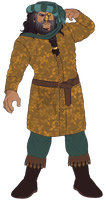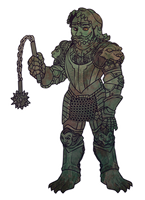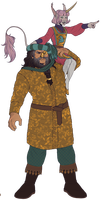Kazimir - "The Manticore"
BonefydSkeleton
- Created
- 1 year, 3 months ago
- Creator
- BonefydSkeleton
- Favorites
- 8
Profile
Kazimir was once a proud king, ruler of a human-like species located high in the mountains. His kingdom was adjacent to the territory of forest dwelling animal hybrid races in the valley below that were governed by a single monarch - The Queen. He was a strong commander and tried his utmost to set a benevolent example, with violence coming only out of necessity. Whenever there was unrest among his citizens he listened to their qualms and assuaged them in whatever way possible, but like any society crime was still a problem, especially for those who decided to take advantage of his kindness. Driven by duty and honor, King Kazimir oversaw all sentences by his own hand, causing many to think he was a cold blooded murderer rather than someone who aimed to spare others the burden of killing fellow citizens.
In the coming years, tensions would rise between The Mountain People and The Queen's Empire. Simple land disputes resulted in death for both parties and when word came from the border that war may be at hand, the people became more ungovernable. Executions grew by the score and the mountain folk began to question the King’s rule. He refused to go to war with the Queen despite the outcry from his people, who seemed to fear the hybrids as though they were rampant beasts that might come to the mountains and topple entire villages in an attempt to extract resources to wage further war. Kazimir wanted to resolve the rising tensions between kingdoms with a trade deal, and perhaps bargain to have soldiers from each side cross the territory as a good diplomatic gesture. His council was certain that any attempt at peaceful dealings would only delay the inevitable. Relinquishing resources would simply give The Queen the means to arm her soldiers better and invade. Kazimir could not stand for this abuse of his knowledge and trust and sent a messenger to the Queen, riding fast to deliver news of potential negotiations.
When word of this arrangement reached citizens, a coup was organized in secret to overthrow the king. The standing army requisitioned weapons to arm the townsfolk from nearby villages and late in the evening, when they were sure the castle had extinguished its candles and suspicions for the night, stormed the gates. Armor and cloth ran as one, pouring into the courtyard and climbing the walls to take prisoners and ransack the place. It was evident that many of the townsfolk were simply here to take advantage of the situation, stealing precious resources and delving into chaos while those who had organized the overthrow of the King sought him out in his chambers. Kazimir was dragged from his bed and despite his size was bested by the men who had come in full gear and armed with weapons.
He was led to the courtyard where he was stripped of his clothing and forced to kneel on the gallows where so many had died by his hand before. In front of the masses, Kazimir was proclaimed a traitor of the realm for even considering peace with The Queen's beasts. Many wanted him dead but at times such as these, the objectors thought it better to make an example of him. They cut off his nipples so that none could suckle at his teat, as was the tradition of more primitive mountain clans that had been folded into his empire. His left ear was cut so that he would no longer be allowed to bear the throne, a custom held by many an empire to mark the disgraced who had fallen from power. With a mighty cleave of a sword, his nose was severed as if to say that anyone who wanted to side with the beasts was no longer worthy of their race-defining humanoid nose. Kazimir was then led to the kingdom’s borders and thrown from the cliff side down to the edge of the forest, left to be picked apart by whatever creatures lurked within.
Though his body was sliced on the sheer rocks and several limbs were broken, Kazimir was too angry to die. The confusion he felt at the betrayal of his people occupied every waking thought as he lay at the foot of the cliffs, ebbing in and out of consciousness until he was found by the Queen’s patrols and brought in for medical attention. It was several days before Kazimir woke in a monastery where several nuns had taken care of his wounds and the local apothecary tended to his fever. He asked for political asylum behind “enemy” lines and was grateful for the care he experienced at the hands of these foreigners. He was a scarred atrocity and yet none of them ran. How could these hybrids be confused for beasts when they showed more care and humanity than his own people? The solitude of the church left him with his thoughts through recovery and when he faced the Queen in person, he knew what he must do.
Kazimir was well aware that without a ruler, his kingdom was bound to fall to the next greedy bastard with resounding authority and a drive to wage the war the denizens of the mountain so craved. The Queen needed every man at her disposal, and his knowledge of the terrain and of his people could give her army the edge they needed. He volunteered himself to train as many regiments as possible before war broke, and for his efforts The Queen knighted him. She donned him The Manticore: a beast who would cannibalize his own people in her name, whose blood ran with the venom of his betrayal, and whose pride and strength in combat were to be unrivaled. She called in her blacksmith, who completed the ceremony by placing the blazing hot casting of a lion’s nose and eye against Kazimir’s face. With a raging bellow that echoed in the Queen’s chamber as his flesh cauterized and molded around the metal, the Manticore was born.
It is said that this bellowing stirred the birds in the forest and carried high into the mountains of his people, warning them of what was to come. It was not a compassionate warning, but a vengeful one. Tales of his prowess in the coming battle to defend the kingdom were chronicled in children's books and manuscripts. The Manticore with his nose of bronze, his heart of steel, and his venom tipped flail. He became somewhat of a hero, but to his people who were slaughtered at his hands once more he was nothing but a monster. Even when the great battles had fallen into nothing but a few petty squabbles and squashed rebellions, Kazimir was caught up in his own internal war. The Queen could see that fighting his own people had taken its toll on him and when some semblance of peace befell both kingdoms, Kazimir was allowed to join the Queen’s guard and “retire” to a more comfortable life alongside two other notable knights who protected her courtyard.
Kazimir was insistent that he could not spend every day sitting idly in the garden, as peaceful as it was. His blood was still hot with determination and without an outlet for it he feared he might truly be driven mad. When he requested an assignment from the Queen, she suggested he should pass his skills onto a suitable apprentice, and Kazimir was gifted his first Squire. He doesn't know much about Knighthood, but he remembers when he could be a kind ruler and the way he had shaped the Queen's army. But those were men, not mere boys.
Kazimir now tries his best to act as a mentor and a fatherly figure to his Squire, hoping that he can spare him the hardship that helped him navigate his own life.



